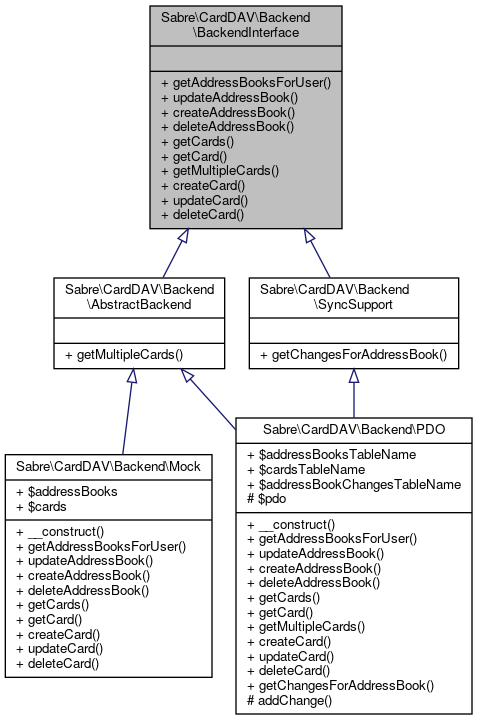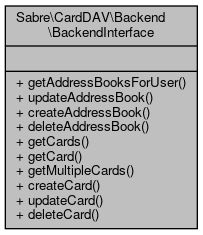CardDAV Backend Interface. More...
 Inheritance diagram for Sabre\CardDAV\Backend\BackendInterface:
Inheritance diagram for Sabre\CardDAV\Backend\BackendInterface: Collaboration diagram for Sabre\CardDAV\Backend\BackendInterface:
Collaboration diagram for Sabre\CardDAV\Backend\BackendInterface:Public Member Functions | |
| getAddressBooksForUser ($principalUri) | |
| Returns the list of addressbooks for a specific user. More... | |
| updateAddressBook ($addressBookId, \Sabre\DAV\PropPatch $propPatch) | |
| Updates properties for an address book. More... | |
| createAddressBook ($principalUri, $url, array $properties) | |
| Creates a new address book. More... | |
| deleteAddressBook ($addressBookId) | |
| Deletes an entire addressbook and all its contents. More... | |
| getCards ($addressbookId) | |
| Returns all cards for a specific addressbook id. More... | |
| getCard ($addressBookId, $cardUri) | |
| Returns a specfic card. More... | |
| getMultipleCards ($addressBookId, array $uris) | |
| Returns a list of cards. More... | |
| createCard ($addressBookId, $cardUri, $cardData) | |
| Creates a new card. More... | |
| updateCard ($addressBookId, $cardUri, $cardData) | |
| Updates a card. More... | |
| deleteCard ($addressBookId, $cardUri) | |
| Deletes a card. More... | |
Detailed Description
Any CardDAV backend must implement this interface.
Note that there are references to 'addressBookId' scattered throughout the class. The value of the addressBookId is completely up to you, it can be any arbitrary value you can use as an unique identifier.
- Copyright
- Copyright (C) fruux GmbH (https://fruux.com/)
Definition at line 18 of file BackendInterface.php.
Member Function Documentation
◆ createAddressBook()
| Sabre\CardDAV\Backend\BackendInterface::createAddressBook | ( | $principalUri, | |
| $url, | |||
| array | $properties | ||
| ) |
Creates a new address book.
This method should return the id of the new address book. The id can be in any format, including ints, strings, arrays or objects.
- Parameters
-
string $principalUri string $url Just the 'basename' of the url. array $properties
- Returns
- mixed
Implemented in Sabre\CardDAV\Backend\PDO, and Sabre\CardDAV\Backend\Mock.
◆ createCard()
| Sabre\CardDAV\Backend\BackendInterface::createCard | ( | $addressBookId, | |
| $cardUri, | |||
| $cardData | |||
| ) |
Creates a new card.
The addressbook id will be passed as the first argument. This is the same id as it is returned from the getAddressBooksForUser method.
The cardUri is a base uri, and doesn't include the full path. The cardData argument is the vcard body, and is passed as a string.
It is possible to return an ETag from this method. This ETag is for the newly created resource, and must be enclosed with double quotes (that is, the string itself must contain the double quotes).
You should only return the ETag if you store the carddata as-is. If a subsequent GET request on the same card does not have the same body, byte-by-byte and you did return an ETag here, clients tend to get confused.
If you don't return an ETag, you can just return null.
- Parameters
-
mixed $addressBookId string $cardUri string $cardData
- Returns
- string|null
Implemented in Sabre\CardDAV\Backend\PDO, and Sabre\CardDAV\Backend\Mock.
◆ deleteAddressBook()
| Sabre\CardDAV\Backend\BackendInterface::deleteAddressBook | ( | $addressBookId | ) |
Deletes an entire addressbook and all its contents.
- Parameters
-
mixed $addressBookId
- Returns
- void
Implemented in Sabre\CardDAV\Backend\PDO, and Sabre\CardDAV\Backend\Mock.
◆ deleteCard()
| Sabre\CardDAV\Backend\BackendInterface::deleteCard | ( | $addressBookId, | |
| $cardUri | |||
| ) |
Deletes a card.
- Parameters
-
mixed $addressBookId string $cardUri
- Returns
- bool
Implemented in Sabre\CardDAV\Backend\PDO, and Sabre\CardDAV\Backend\Mock.
◆ getAddressBooksForUser()
| Sabre\CardDAV\Backend\BackendInterface::getAddressBooksForUser | ( | $principalUri | ) |
Returns the list of addressbooks for a specific user.
Every addressbook should have the following properties: id - an arbitrary unique id uri - the 'basename' part of the url principaluri - Same as the passed parameter
Any additional clark-notation property may be passed besides this. Some common ones are : {DAV:}displayname {urn:ietf:params:xml:ns:carddav}addressbook-description {http://calendarserver.org/ns/}getctag
- Parameters
-
string $principalUri
- Returns
- array
Implemented in Sabre\CardDAV\Backend\PDO, and Sabre\CardDAV\Backend\Mock.
◆ getCard()
| Sabre\CardDAV\Backend\BackendInterface::getCard | ( | $addressBookId, | |
| $cardUri | |||
| ) |
Returns a specfic card.
The same set of properties must be returned as with getCards. The only exception is that 'carddata' is absolutely required.
If the card does not exist, you must return false.
- Parameters
-
mixed $addressBookId string $cardUri
- Returns
- array
Implemented in Sabre\CardDAV\Backend\PDO, and Sabre\CardDAV\Backend\Mock.
Referenced by Sabre\CardDAV\Backend\AbstractBackend\getMultipleCards().
 Here is the caller graph for this function:
Here is the caller graph for this function:◆ getCards()
| Sabre\CardDAV\Backend\BackendInterface::getCards | ( | $addressbookId | ) |
Returns all cards for a specific addressbook id.
This method should return the following properties for each card:
- carddata - raw vcard data
- uri - Some unique url
- lastmodified - A unix timestamp
It's recommended to also return the following properties:
- etag - A unique etag. This must change every time the card changes.
- size - The size of the card in bytes.
If these last two properties are provided, less time will be spent calculating them. If they are specified, you can also ommit carddata. This may speed up certain requests, especially with large cards.
- Parameters
-
mixed $addressbookId
- Returns
- array
Implemented in Sabre\CardDAV\Backend\PDO, and Sabre\CardDAV\Backend\Mock.
◆ getMultipleCards()
| Sabre\CardDAV\Backend\BackendInterface::getMultipleCards | ( | $addressBookId, | |
| array | $uris | ||
| ) |
Returns a list of cards.
This method should work identical to getCard, but instead return all the cards in the list as an array.
If the backend supports this, it may allow for some speed-ups.
- Parameters
-
mixed $addressBookId array $uris
- Returns
- array
Implemented in Sabre\CardDAV\Backend\AbstractBackend, and Sabre\CardDAV\Backend\PDO.
◆ updateAddressBook()
| Sabre\CardDAV\Backend\BackendInterface::updateAddressBook | ( | $addressBookId, | |
| \Sabre\DAV\PropPatch | $propPatch | ||
| ) |
Updates properties for an address book.
The list of mutations is stored in a Sabre\DAV\PropPatch object. To do the actual updates, you must tell this object which properties you're going to process with the handle() method.
Calling the handle method is like telling the PropPatch object "I promise I can handle updating this property".
Read the PropPatch documentation for more info and examples.
- Parameters
-
string $addressBookId \Sabre\DAV\PropPatch $propPatch
- Returns
- void
Implemented in Sabre\CardDAV\Backend\PDO, and Sabre\CardDAV\Backend\Mock.
◆ updateCard()
| Sabre\CardDAV\Backend\BackendInterface::updateCard | ( | $addressBookId, | |
| $cardUri, | |||
| $cardData | |||
| ) |
Updates a card.
The addressbook id will be passed as the first argument. This is the same id as it is returned from the getAddressBooksForUser method.
The cardUri is a base uri, and doesn't include the full path. The cardData argument is the vcard body, and is passed as a string.
It is possible to return an ETag from this method. This ETag should match that of the updated resource, and must be enclosed with double quotes (that is: the string itself must contain the actual quotes).
You should only return the ETag if you store the carddata as-is. If a subsequent GET request on the same card does not have the same body, byte-by-byte and you did return an ETag here, clients tend to get confused.
If you don't return an ETag, you can just return null.
- Parameters
-
mixed $addressBookId string $cardUri string $cardData
- Returns
- string|null
Implemented in Sabre\CardDAV\Backend\PDO, and Sabre\CardDAV\Backend\Mock.
The documentation for this interface was generated from the following file:
- libs/composer/vendor/sabre/dav/lib/CardDAV/Backend/BackendInterface.php



